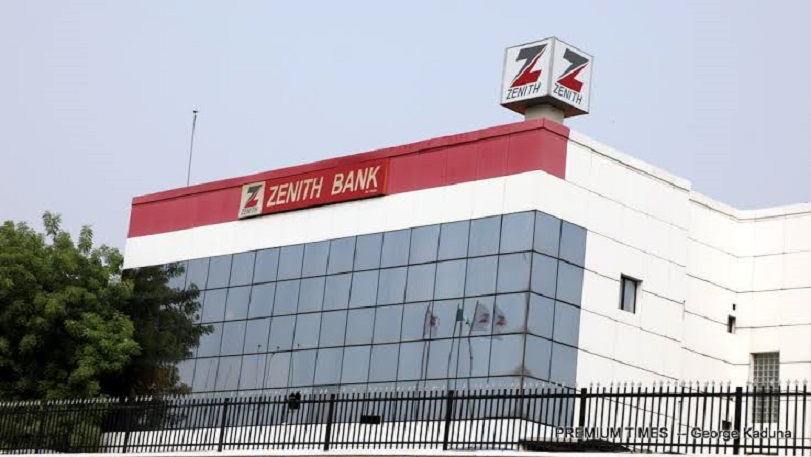Banking
Access Bank Risks Negative Pressures After Merger—Moody’s

By Dipo Olowookere
Renowned rating agency, Moody’s Investors Service, has warned that Access Bank may experience negative pressures on its capital and asset risk metrics as a result of its merger with Diamond Bank Plc.
This disclosure was made in a statement issued recently, where it announced that it was placing the ratings of the Nigerian lender under review for downgrade.
Moody’s said it was looking to lower the B2 long-term local currency deposit rating of Access Bank as well as its B3 long-term foreign currency deposit rating, its b2 Baseline Credit Assessment (BCA) and Adjusted BCA, its B1 long-term Counterparty Risk Rating (CRR) and its B1(cr) long-term Counterparty Risk Assessment (CRA).
However, Moody’s said it was placing Diamond Bank Plc’s Caa1 long-term deposit ratings, its caa3 BCA and Adjusted BCA, its Caa1 CRR and its Caa1(cr) CRA on review for upgrade.
In late 2018, Diamond Bank and Access Bank announced their intentions to merge to become a big and formidable entity.
In its statements, Moody’s said it was reviewing the banks’ ratings following the approval of their announced merger by the Securities and Exchange Commission (SEC) on January 18, 2019, after a preliminary approval of the transaction by the Central Bank of Nigeria (CBN) in December 2018.
“Access Bank’s ratings are placed on review for downgrade to reflect the potential negative pressures on its capital and asset risk metrics as a result of the merger, while Diamond Bank’s review for upgrade reflects the expected convergence of its creditworthiness and ratings with those of Access Bank upon completion of the transaction,” the agency said.
Moody’s explained that its primary driver underpinning the decision to initiate a review for downgrade of Access Bank’s ratings is the expected weakening of the bank’s solvency profile, driven by a lower tangible common equity (TCE) ratio amid higher asset risks.
It noted that Access Bank will acquire a large balance sheet (about N1.6 trillion as of September 2018), mainly consisting of net loans (about N730 billion), which will increase its risk weighted assets, while Diamond Bank’s undercapitalization will likely strain Access Bank’s TCE.
Moody’s expects Access Bank’s post-merger TCE ratio will decline to around 10%, reducing the bank’s loss absorbance buffers. The TCE would also decline below the median for global peers with b2 BCA.
In addition, the rating agency expects Access Bank’s asset risk to increase because of the additional risk assets it will acquire from Diamond Bank.
The rating agency views Diamond Bank’s risk management and underwriting procedures as weaker than those of Access Bank and therefore expects a higher formation of nonperforming loans (NPLs) from Diamond Bank’s loan book that Access Bank will acquire. The rating agency also expects substantial operational risks to be introduced by this sizeable acquisition.
For Diamond Bank, the review for upgrade is driven by the fact that upon completion of the merger, Diamond Bank’s assets, liabilities and undertakings will be assumed by Access Bank, a stronger entity, who will become the obligor of former Diamond Bank’s creditors.
The review on both banks will conclude upon the legal completion of the merger and will take stock of any new relevant information that might be available at that time.
For Access Bank, the rating agency says that the review for downgrade will focus on (1) the impact of a successful completion of the merger on Access Bank’s solvency ratios (asset risk and capital metrics), (2) the extent to which the merger will improve Access Bank’s profitability and funding and liquidity profiles, and (3) any integration challenges that will arise from onboarding Diamond Bank’s assets and liabilities and staff.
The review will assess how Access Bank will implement measures to increase its capital buffers to enable it to absorb new credit losses that will come from Diamond Bank’s loan book. The rating agency will assess any plans by Access Bank to reduce its risk assets and improve its capital upon completion of the merger.
The review will consider the impact of Diamond Bank’s loan book on Access Bank’s asset quality, including the amount of NPLs that Access Bank will inherit from Diamond Bank, and the level of provisions of the NPLs, although management indicated that a large portion of Diamond Bank’s current NPLs will be written off before conclusion of the transaction.
Moody’s said it will also assess the positive impact of Diamond Bank’s largely retail deposit book to Access Bank’s deposit structure and tenor.
As of September 2018, Access Bank would acquire N1.1 trillion customer deposits from Diamond Bank, providing it with deposits that are cheaper than its current cost of funding. The rating agency will consider the impact of possible revenue enhancements and any long-term cost savings, viewed against short-term restructuring costs.
The review will also take into consideration material implementation challenges associated with the acquisition of a large bank such as Diamond Bank.
As of September 2018, Diamond Bank’s total assets constituted 34% of Access Bank’s assets and Moody’s estimates that Diamond Bank’s total assets will contribute about 23% of merged entity total assets.
Access Bank will need to successfully integrate its newly acquired staff and IT and processing platforms while ensuring that the business does not suffer during the integration period. Moody’s recognizes Access Bank’s good track record in mergers and acquisitions.
Moody’s said the review for upgrade on Diamond Bank’s deposit ratings reflects the prospects that the rated deposits and liabilities of Diamond Bank will benefit from Access Bank’s stronger risk profile, and the rating agency will align Diamond Bank’s long-term deposit ratings with those of Access Bank. These are currently B2 on review for downgrade for local currency, and B3 on review for downgrade for foreign currency.
The rating agency will assess the extent to which Diamond Bank’s current solvency weaknesses that are a result of its high NPLs, low provisions and low capital will be addressed by the merger.
The rating agency will also consider the implication of the merger to Diamond Bank’s foreign currency liquidity, in light of the significant refinancing needs in the first half of 2019.
Moody’s said it will withdraw Diamond Bank’s ratings upon completion of the merger because Diamond Bank will cease to exist as a separate legal entity.
Banking
Development Bank of Nigeria Wins Financial Inclusion Leadership Award

By Aduragbemi Omiyale
In recognition of its unwavering commitment to fostering access to financing for Nigerian micro, small and medium enterprises (MSMEs), Development Bank of Nigeria Plc has been rewarded with the Financial Inclusion Leadership Award at the Champions of Inclusion Nigeria Financial Inclusion Awards.
This was at the 2024 International Financial Inclusion Conference (IFIC) organised by the Central Bank of Nigeria (CBN) in collaboration with the World Bank and other stakeholders.
The chief executive of the lender, Mr Tony Okpanachi, said the recognition affirms the company’s efforts in expanding access to financial services for MSMEs in Nigeria.
“We are honoured to receive the Financial Inclusion Leadership Award, which is a testament to our bank’s commitment to expanding access to financial services for all Nigerians. This award recognises our efforts to bridge the financial inclusion gap, particularly for a priority sector like the MSMEs.
“Additionally, this award is a validation of our strategic focus on driving financial inclusion for small businesses, and we are proud to be at the forefront of this initiative that drives that. We will continue to innovate and expand our financial inclusion programmes, ensuring that more Nigerian small and startup businesses have access to services,” he stated.
On his part, the Chief Operating Officer of DBN, Mr Bonaventure Okhaimo, said the accolade demonstrates the firm’s dedication to driving financial inclusion and economic growth in Nigeria.
“This award acknowledges our Bank’s innovative approach to widening opportunities for MSMEs in Nigeria to grow and scale their businesses,” he said.
“This award will motivate us to continue pushing the boundaries of financial inclusion, exploring more innovative solutions and partnerships to expand our reach and impact.
“We are committed to ensuring that more small businesses and startup enterprises in Nigeria have access to financial services, this award will further inspire us to accelerate our efforts in this regard,” he stated.
Banking
The Banker Magazine Declares Zenith Bank as Bank of the Year in Nigeria

By Modupe Gbadeyanka
The Banker Magazine of the Financial Times Group in the United Kingdom has announced Zenith Bank Plc as Bank of the Year, Nigeria.
At the Banker’s Bank of the Year Awards 2024 held on in London on Wednesday, December 4, 2024, it was stated that Nigerian lender clinched the award for its strong management, sound business model and strategy, and approach to sustainability and ESG banking practices.
The chief executive of Zenith Bank, Ms Adaora Umeoji, described the recognition as a “testament to the unwavering trust and loyalty of our esteemed customers, the unparalleled leadership and guidance of the board and management as well as the hard work and dedication of our staff.”
She said, “It also reflects our bank’s steadfast commitment to delivering excellent services to our customers and contributing to the growth and development of the Nigerian economy.”
“We will continue to invest in innovative technologies, expand our range of products and services, and maintain our commitment to exceptional customer service in order to sustain our position as Nigeria’s Number One Bank,” Ms Umeoji assured.
The Banker’s Bank of the Year accolade is among the most coveted and widely regarded award in the banking industry.
Often contested by the world’s leading financial institutions, the winners span across Africa, Asia-Pacific, Central & Eastern Europe, Latin America, the Middle East, North America and Western Europe.
Recall that last month, Zenith Bank commissioned its branch in Paris, France following the granting of the final approval by the country’s banking regulator, the Autorité de ContrôlePrudentiel et de Résolution (ACPR).
This is part of the bank’s global expansion strategy, and its commitment to serving clients wherever their businesses are around the world.
Zenith Bank has continued to earn numerous awards, with this latest accolade coming on the heels of several recognitions, including being the Number One Bank in Nigeria by Tier-1 Capital for the 15th consecutive year in the 2024 Top 1000 World Banks Ranking, published by The Banker Magazine.
Banking
CBN Reveals Phone Numbers to Report Banks Not Disbursing Cash

By Modupe Gbadeyanka
The Central Bank of Nigeria (CBN) has published some phone numbers citizens can call to report any bank that fails to give them cash over-the-counter or at Automated Teller Machines (ATMs).
In a circular, the banking sector regulator said cash has been made available to lenders to disburse to their customers, saying they have no reason to do so.
DMBs are directed to ensure efficient cash disbursement to customers OTC and through ATMs as the CBN will intensify its oversight roles to enforce this directive and ensure compliance,” a part of a circular signed by acting Director of Currency Operations, Solaja Mohammed Olayemi; and the acting Director for Branch Operations, Isa-Olatinwo Aisha, stated.
It encouraged members of the public who are unable to obtain cash at their banks to “report these instances using the designated reporting channels and format provided,” saying it will “assist the CBN in addressing issues hindering the availability of cash and further improve currency circulation.”
They are to reach the central bank through designated phone numbers of the CBN branch in the state where the incident occurred or via email.
According to the circular, the complaints should be sent with “the relevant details which shall include account name/name of the DMB/amount/time and date of incidents, amongst others.”

-

 Feature/OPED5 years ago
Feature/OPED5 years agoDavos was Different this year
-
Travel/Tourism8 years ago
Lagos Seals Western Lodge Hotel In Ikorodu
-

 Showbiz2 years ago
Showbiz2 years agoEstranged Lover Releases Videos of Empress Njamah Bathing
-

 Banking6 years ago
Banking6 years agoSort Codes of GTBank Branches in Nigeria
-

 Economy2 years ago
Economy2 years agoSubsidy Removal: CNG at N130 Per Litre Cheaper Than Petrol—IPMAN
-

 Banking2 years ago
Banking2 years agoFirst Bank Announces Planned Downtime
-

 Sports2 years ago
Sports2 years agoHighest Paid Nigerian Footballer – How Much Do Nigerian Footballers Earn
-

 Technology4 years ago
Technology4 years agoHow To Link Your MTN, Airtel, Glo, 9mobile Lines to NIN












